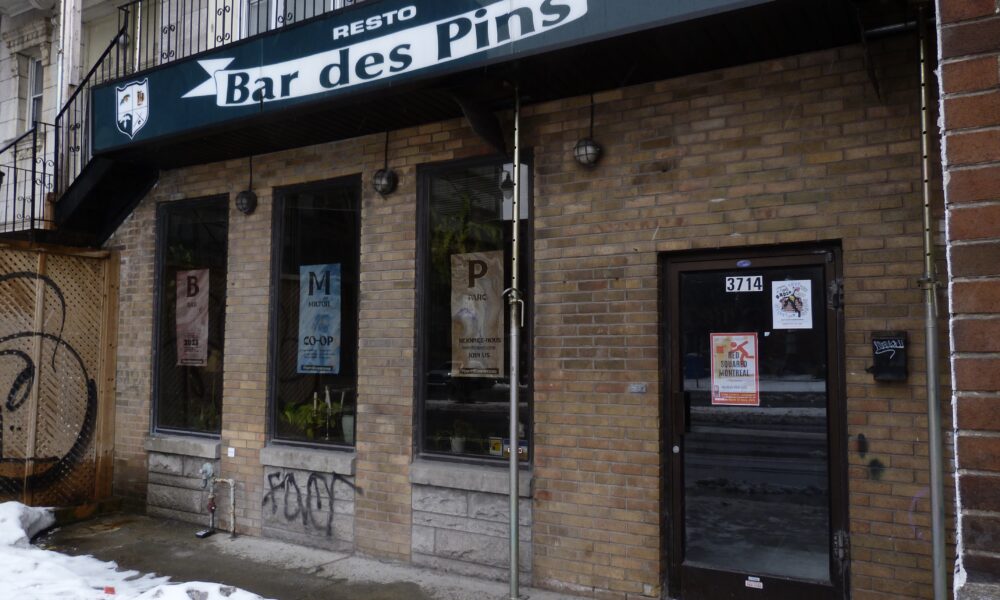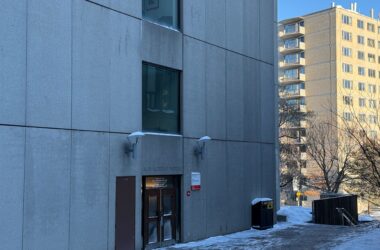In a plebiscite during the Winter 2023 Students’ Society of McGill University (SSMU) referendum, students voted overwhelmingly in favour of investing their student fees in Co-op Bar Milton-Parc—a community-led cooperative that aims to create a space for students and local groups to gather.
The café-pub, located at the corner of Parc and des Pins, will be a multifunctional co-working space and meeting place for community events and projects by day, with a lively community bar by night. Bar Milton-Parc has gradually begun opening to the public since July 2022 by hosting occasional events and launching “Co-work Wednesdays”, where the coworking space is open from 4 p.m. to 10 p.m. for members. It hopes to fully open as early as Fall 2023.
The Société de Développement Communautaire Milton Parc (SDC)—a non-profit organization that owns multiple businesses and offices along Parc Avenue—purchased the former Bar des Pins in early 2021. The SDC extended a vote to the Milton Parc community to decide what should be done with the commercial space. The community decided on the creation of Bar Milton-Parc, which aims to become a hub for live events, speaker panels, and community forums. For a one-time fee of $20, members can buy into the cooperative, giving them access to the co-working space and reduced prices on food and beverages.
Malcolm McClintock, a leader of the Bar Milton-Parc project and former Engineering representative to SSMU, has several hopes for the future of the initiative.
“We want to make this a transformative space that is welcoming to all folks,” McClintock said in an interview with The Tribune. “Our main purpose is to provide a space for groups who are animating for the direct community around us.”
Central to the Bar Milton-Parc project is a solidarity meal program, through which the bar hopes to provide affordable meals to the Milton Parc community. The co-op will take a local approach to combat rising food insecurity in Montreal and offer relief to community members and students in need.
“In the near future, we want to be able to offer [a pay-what-you-can system] at least every day of the week for lunch,” McClintock said. “Unfortunately, the infrastructure to support something like that requires a lot of upfront money, something that we currently don’t have. We want to be a transformative space, but that requires renovations, and renovations cost money.”
SSMU vice-president (VP) Finance Marco Pizarro says there is a possibility of investing five per cent of SSMU’s Capital Investment Fund into Bar Milton-Parc, but stressed that the recent vote was non-binding.
“Future funding for Bar Milton-Parc ultimately needs to be voted upon by the Board of Directors,” Pizarro wrote to The Tribune via email. “Following interest by the student body, there needs to be consultation with the SSMU finance committee, [the] community engagement committee, and the Legislative Council.”
Five per cent of SSMU’s Capital Investment Fund would represent approximately $150,000, which would greatly accelerate Bar Milton-Parc’s renovation plans and allow it to expand both its opening hours and its services.
“The Co-op Bar Milton-Parc is built on the history of the Milton Parc neighbourhood. It is only made possible by the longer standing history of the housing network of cooperatives that have come together with the desire to create a space where the community can gather, and meet the general needs that people have, both socially and physically.”
– Malcolm McClintock in an interview with the tribune
Delineated by University Street, Avenue des Pins, Saint-Laurent Boulevard, and Sherbrooke Street, the Milton Parc neighbourhood is considered one of Montreal’s historical residential areas. Over 600 buildings in the area, including Bar Milton-Parc, are owned by the Milton Parc Community (CMP), a community-led cooperative that offers affordable housing and various social provisions.
By 1968, Concordia Estates Ltd had bought 96 per cent of the properties in Milton Parc, and planned to demolish the neighbourhood to construct a massive real-estate development project. The residents of Milton Parc came together to oppose the urban renewal project and formed the Milton Parc Citizen’s Committee (CCMP/MPCC) in an effort to preserve the area’ architectural diversity and heritage. After nearly two decades of struggle, only the first phase of the project, the construction of the La Cité Complex, was completed.
Dimitri Roussopoulos, a founding member of the CCMP, recounted the community’s struggle to preserve the neighbourhood during an interview with The Tribune.
“We undertook to save this whole six-block area from complete destruction by a company of speculators that wanted to build high-rises, condominiums, and apartment buildings,” Roussopoulos said. “It involved a lot of demonstrations, petitioning, and public information meetings. We created a city-wide coalition to support the struggle […] and managed to convince the federal and provincial government to give us the money to buy the whole area and renovate it.”
With the aid of Héritage Montréal and the Canadian Mortgage and Housing Corporation (CMHC), the Milton Parc community repurchased the remaining properties between 1979 and 1982, creating the largest cooperative housing project in North America. At this point, the characteristic Victorian architecture of Milton Parc, which dates back to the 19th century, was falling into disrepair.
Phyllis Lambert, director and founder of the Canadian Centre for Architecture, played a pivotal role in the renovations and in securing CMHC’s approval of the project.
“You have to follow your dreams. When we started Heritage Montreal to save buildings from demolition, we had no idea how you could ever occupy these buildings again,” Lambert said. “But we didn’t worry about that. And then, as you work through what the possibilities are, you find solutions.”
In 1987, the National Assembly of Quebec passed a private bill to allow the co-ops and non-profit organizations of Milton Parc to jointly own the land under a syndicate: the Milton Parc Community. The CMP is governed by a panel of representatives from each of the 24 non-profit organizations and cooperatives that co-own the land trust.
Unlike a regular land trust, which identifies a legal entity and the assets it has authority over, the CMP is characterized by its unique “Declaration of Co-ownership.” The Declaration includes socio-economic clauses which mandate signatory organizations to uphold social responsibilities and limit real estate speculation in order to maintain low rents in the area.
Milton Parc is home to many community initiatives, including a library on Parc Avenue, which the CCMP runs and that serves as a hub to promote events within the community. Every Friday, the CCMP works with the Saint John’s food bank and distributes 80 to 100 meals to Montrealers in need.
Since the 2000s, the community has actively fought to preserve green spaces in the neighbourhood. Under Lucia Kowaluk’s leadership, the CCMP thwarted the construction of a high-rise in 2019 in favour of the construction of a park through a successful petition that amassed thousands of signatures. The park, located at the junction of Parc and des Pins, will be named in honour of the late Kowaluk.
Since 2010, McGill’s Office of the Dean of Students, SSMU, and the CCMP have coordinated their efforts through the Community Actions and Relations Endeavour in order to facilitate the coexistence of students and permanent residents of Milton Parc. Tensions have stemmed from the turbulent nightlife of student tenants, as well as the accumulation of trash in the streets during the months of May and June, when many are moving.
“We’re constantly interested in working towards better relations with the McGill faculty and the bigger student body. That’s our sincere hope. But it’s a work in progress,” Roussopoulos said.
SSMU’s endorsement of the Bar Milton-Parc project would not only expedite the bar’s opening, but also result in SSMU being eligible for support-member status at the bar, giving McGill students privileged booking opportunities to host events. SSMU’s investment in the bar rests on the conditions that McGill students be eligible for the co-op’s solidarity meal program and that student groups get priority booking.
Daniel Tamblyn-Watts, 4L, told The Tribune that he regularly frequents the bar because of its ties to Milton Parc and McGill.
“I love that it’s run by a very community-oriented crowd, they give off the vibe they aren’t just trying to turn a profit on you,” Tamblyn-Watts said. “It’s amazing, you can listen to different conversations where people are talking about really interesting things they’re doing in the community, and at the same time, it’s a really low-cost and friendly environment to have a beer with some friends.”









